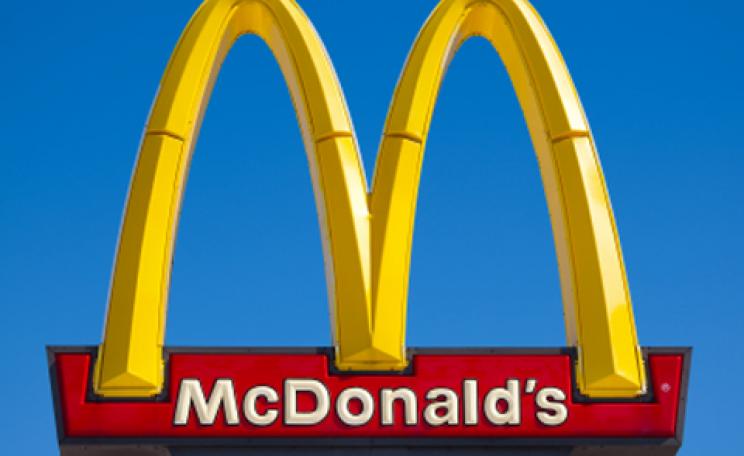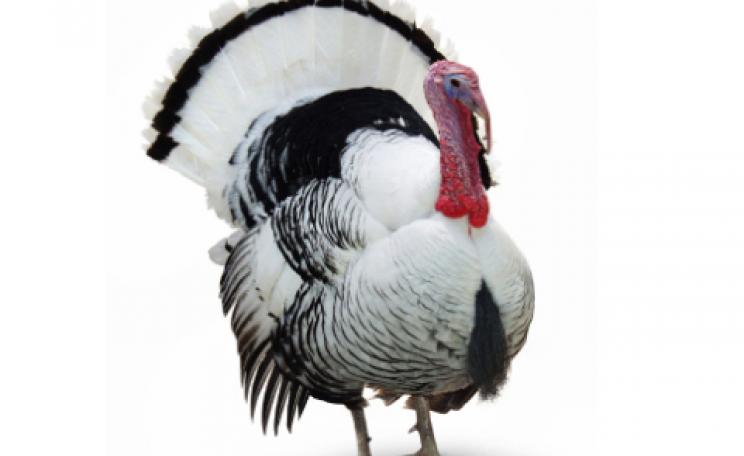Many of the Christmas birds we eat are intensively reared
Some associations are hard to get away from. Think about turkey - the bird, not the country - and your mind usually turns to Christmas. If you’re British you might also think of Bernard Matthews. The company’s turkey slices are a supermarket staple, and are possibly the only products most people eat from the bird during any month other than December. If the East Anglian firm has its way, the average meat-eater will soon be changing his or her ways.
The company, already one of Britain’s biggest producers of turkey, wants to put its meat on plates across the UK. It is pushing a national advertising campaign led by “turkey ambassador” Marco Pierre White including a particularly stilted dinner-table conversation between the former top chef and Spandau Ballet bassist and one-time Eastender Martin Kemp. With Christmas fast approaching, it’s a great time to take a look at the Bernard Matthews brand and ask just what lies beyond celebrity chefs and erstwhile pop-soap stars.
Perhaps the most surprising thing about the company is that it is still around at all, after a scandal-hit few years between in mid-to-late noughties. In 2005, another celebrity chef, Jamie Oliver, launched a campaign to get children eating more healthily. A particular bone of contention was the widespread sale of Bernard Matthews highly processed, deep-fried Turkey Twizzlers in schools. Oliver made them a symbol of the poor dietary choices available for children, and the company quietly discontinued the line in 2005.
A year later, two Bernard Matthews staff members were sentenced to 200 hours of community service after being secretly filmed by undercover investigators from the Hillside Animal Sanctuary playing baseball with live turkeys. The RSPCA inspector who investigated the video said that it was the worst case of animal cruelty he had ever seen. The two claimed that animal cruelty was institutionalised at Haveringland, the Norfolk facility where they were employed. In 2007 Hillside Animal Sanctuary claimed to have obtained further shocking footage of workers playing football with turkeys.
 Also in 2007, the company was beset by an even bigger crisis: an outbreak of the H5N1 virus - better known as bird flu - was traced back to another Bernard Matthews facility in Suffolk. The UK’s Department for Environment, Food and Rural Affairs (Defra) noted in a February 2007 report that the company had been warned repeatedly about hygiene issues at the turkey farm over the previous year. The source of the outbreak was never discovered but the company regularly imported turkeys from Hungary, where an identical strain of the virus had been discovered, to the UK. Just as the H5N1 affair was dying down, the company became embroiled in yet more controversy when it was revealed that it had received government compensation of around half a million pounds to help mitigate losses caused by bird flu, while workers at the Suffolk facility had been laid off without compensation.
Also in 2007, the company was beset by an even bigger crisis: an outbreak of the H5N1 virus - better known as bird flu - was traced back to another Bernard Matthews facility in Suffolk. The UK’s Department for Environment, Food and Rural Affairs (Defra) noted in a February 2007 report that the company had been warned repeatedly about hygiene issues at the turkey farm over the previous year. The source of the outbreak was never discovered but the company regularly imported turkeys from Hungary, where an identical strain of the virus had been discovered, to the UK. Just as the H5N1 affair was dying down, the company became embroiled in yet more controversy when it was revealed that it had received government compensation of around half a million pounds to help mitigate losses caused by bird flu, while workers at the Suffolk facility had been laid off without compensation.
The bird flu outbreak hit the company hard. It had to slaughter almost 160,000 birds at the Suffolk farm and suffered a catastrophic loss of confidence in its products. Sales of turkey products halved almost overnight, and a YouGov poll showed that by February 2007, the company had become one of the country’s least respected or trusted brands. Bernard Matthews ran up losses of £77m in 2007 and didn’t return to profitability until 2010, when Matthews, the founder, passed away, having retired from the managing the firm in 2009. Since the company’s 2007 annus horribilis it has been on a drive to improve its image. In particular, it has moved to using only meat from turkeys reared in the UK, and in 2008 acquired free range turkey specialist Lincs Farms, instantly adding a free range offering to its product line. It has also continued to push the line that turkey meat is healthier than most other meat and poultry, and has worked on a number of initiatives to get Britons eating more turkey. The company reckons that only six per cent of UK households eat fresh turkey on a regular basis compared to 38 per cent for chicken.
Since the company’s 2007 annus horribilis it has been on a drive to improve its image. In particular, it has moved to using only meat from turkeys reared in the UK, and in 2008 acquired free range turkey specialist Lincs Farms, instantly adding a free range offering to its product line. It has also continued to push the line that turkey meat is healthier than most other meat and poultry, and has worked on a number of initiatives to get Britons eating more turkey. The company reckons that only six per cent of UK households eat fresh turkey on a regular basis compared to 38 per cent for chicken.
It has also made some forays into becoming a more sustainable energy consumer, receiving approval for the construction of five wind turbines at its Holton site, which will produce as much as 25 per cent of the company’s annual energy needs. In January, plans to build more wind power capacity at Weston Longfield were scuppered, when a local council refused to give planning permission for the construction of more turbines. Meanwhile, in November the company announced plans to build a biogas plant at Holton that would convert 28,000 tonnes of liquid waste into methane gas. The project, which it is developing with specialist renewable energy firm, Glendale Power, is slated for completion in 2013. The plant will reduce the number of lorry journeys associated with the Holton facility by 60 per cent.
Bernard Matthews now trumpets the standards at its production sites and the health benefits, but coming in the wake of recent scandals, it’s impossible not to have lingering doubts about its track record. In many ways, the lean years of the mid-noughties have forced the company to introduce more exacting standards that gel with ethically minded consumers’ needs. Since the bird flu outbreak, for example, the company’s decision to use only meat produced in the UK has cut the carbon footprint of its meat, as has the move to using locally produced wheat. For those concerned about the state of the British economy, these decisions have also had a decent impact on its status as a regional employment generator. The decision to use more renewable energy is also laudable.
Although unable to respond to our queries in time, on its website, Bernard Matthews states the welfare of its turkeys 'always comes first' and that they are certified to Quality British Turkey standards. 'On the farms, in transport or at slaughter, all our turkeys are treated humanely, professionally and with compassion'.
But at the same time, the company is still a major intensive farmer of birds - the free range element of its product line-up is only a small part of the seven million turkeys it farms annually, say critics - and one with a poor track record of maintaining high animal welfare standards, according to campaigners. Even it if were to meet the most stringent of UK guidelines, many animal welfare campaigners would still argue that conditions at its farms are wanting. And if you don’t want to support an intensive animal farmer, the big question is whether buying its free-range products helps support questionable practices or, conversely, gives the producer an incentive to focus on overhauling their ethics?
If you opt for turkey this Christmas and times are tight, you will be hard pushed to find a bird as well-priced, free range or not, as Bernard Matthews’. The conundrum, as always, is whether or not it’s really worth it?
| READ MORE... | |
 |
GREEN LIVING Charity gifting: do festive gifts mean misery for animals? With Animal Aid raising concerns about the welfare of livestock sent abroad at Christmas by groups such as Oxfam and Christian Aid, is it time to take another look at charity giving? |
 |
GREEN LIVING Frankincense and myrrh: an ethical nightmare? Frankincense and myrrh are prized for their fabulous scent and are an essential ingredient in beauty products. But with 90 per cent of the global supply originating in war-torn Somalia, just how ethical can they really be? |
 |
GREEN LIVING Five of the best…foodie gifts to make at home Eco-friendly, delicious and ultra personal: Laurie Tuffrey explains why homemade treats trump Tesco’s and how to make them |
 |
GREEN LIVING The Ecologist guide to Christmas shopping Ditch the high street and shop ethically this Christmas. Laurie Tuffney shows you where to look |
 |
GREEN LIVING How to... make your own Christmas decorations Instead of heading to the supermarket for your baubles, take the green route and create your own |








